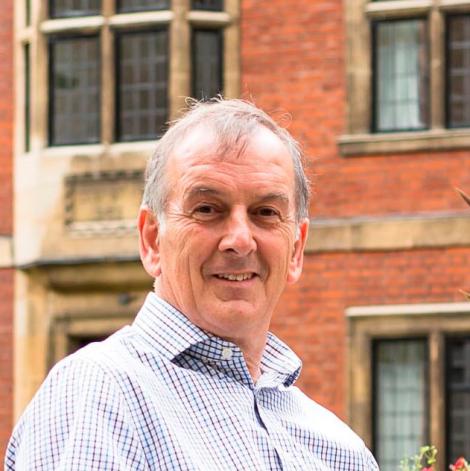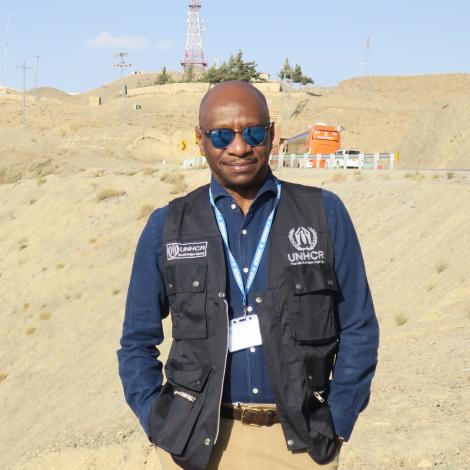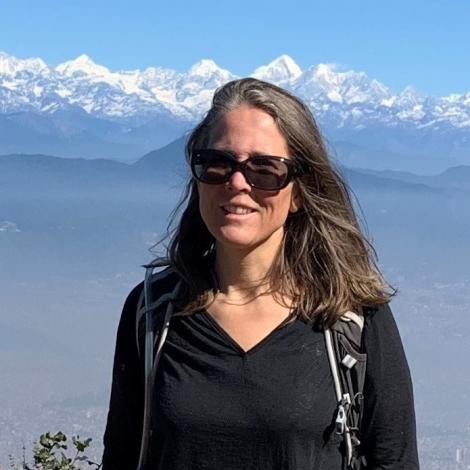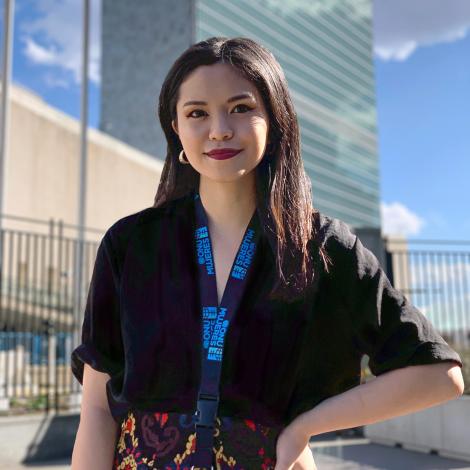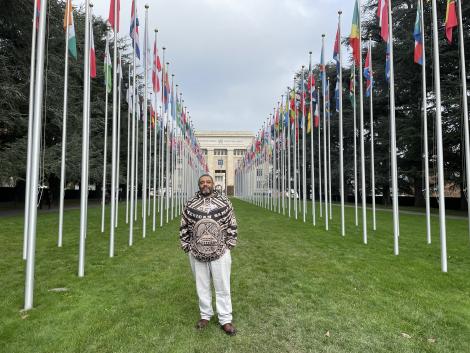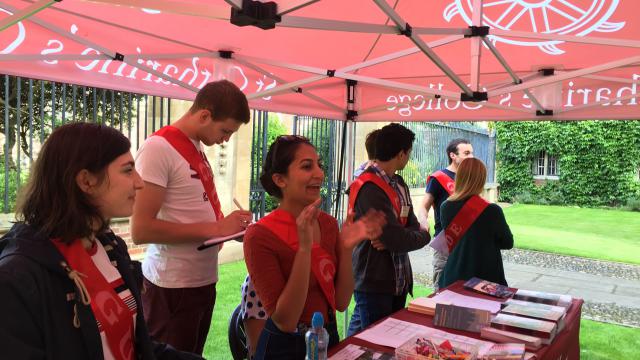
The United Nations (UN) was created on 25 October 1945, in response to the devastation caused by World War II. Today, the UN is made up of 193 Member States and works to maintain international peace and security, give humanitarian assistance to those in need, protect human rights, and uphold international law.
A number of the College’s students, Fellows and alumni have supported the UN’s activities since its inception. Read on to find out how a few of them have been involved during and after their time at St Catharine’s.
Professor John Pyle CBE (1986; Emeritus Fellow 2018)
Professor Pyle has studied the depletion of the stratospheric ozone layer and supported the ‘Montreal Protocol on Substances that Deplete the Ozone Layer’. In 2009, the Vienna Convention and the Montreal Protocol became the first treaties in the history of the UN to achieve universal ratification. He recently commented:
“Article 6 of the Montreal Protocol called for ‘appropriate panels of experts’ – now known as the Scientific Assessment Panel, the Environmental Effects Assessment Panel and the Technology and Economic Assessment Panel – to assess and report on the latest available scientific, environmental, technical and economic information ‘beginning in 1990, and at least every four years thereafter’.
“These reports assess evidence on the state of the ozone layer, identify the impact of any interventions and, ultimately, inform decisions taken by UN representatives about whether to amend or adjust the Protocol at all. I am proud to have been involved in all the reports ever produced by the Scientific Assessment Panel, first as an author and as one of the four international co-chairs of the Panel since 2008.”
Read our recent article about Professor Pyle’s work on the ozone layer.
Dr Khalid Mahgoub (1991, Natural Sciences)
After completing his PhD at St Catharine’s, Dr Mahgoub’s work with the UN High Commissioner for Refugees (UNHCR) has taken him to Rwanda, Bosnia and Herzegovina, Morocco, Zambia, Pakistan (twice), Iran, Tanzania, Lebanon and South Africa.
The College interviewed Dr Mahgoub in 2021 about his career, when he was Head of the UNHCR Sub-Office in Kirehe, Rwanda:
“I was interviewed at the World Intellectual Property Organization, part of the UN, because my scientific background was relevant to issues surrounding the Human Genome project. Although the interview went well, there were delays so I ended up joining the World Health Organization on a short-term project, before joining the UNHCR.
“It is a demanding tough job – away from home and sometimes in very remote areas with difficult living conditions – but it is extremely rewarding when I help to protect refugees and find durable solutions for their plight. This requires the support of countries and international organisations, which can be challenging as this is often dependent on funds and the political will of governments.”
Dr Harriet Torlesse (1991, Archaeology & Anthropology)
After graduation, Dr Torlesse completed her PhD in nutrition and embarked on a career with the UN. Back in 2021, she told us:
“My work since has focused on maternal and child nutrition in various African and Asian countries, primarily for the UN Children’s Fund (UNICEF). I returned to the UK after serving as the Regional Nutrition Advisor at the UNICEF Regional Office for South Asia, based in Nepal. I now work for the UNICEF New York office, remotely from the UK.
“I can trace my postgraduate studies and career in international development to studying child nutrition in Sudan for my dissertation, supported by a College travel grant.”
Gaia Reyes (2016, Human, Social and Political Sciences)
Gaia interned with the Philippine Delegation to the UN Paris Climate Conference (COP21) in 2015. After graduating, she joined the Ending Violence Against Women policy division at UN Women, the UN Entity for Gender Equality and Women’s Empowerment, before transitioning to the Executive Director’s Office. In 2021, Gaia told us about her experience at the UN:
“Being open and receptive to different cultures, languages and people is especially important when navigating larger international organisations.”
Gaia currently serves as a Human Rights Policy Adviser at the UK Mission to the UN, as part of the Foreign, Commonwealth and Development Office. She leads on efforts to advance human rights at the UN General Assembly, covering corruption, drugs, crime, human trafficking and the rights of marginalised populations.
She said, “Studying HSPS provided a valuable grounding on the world’s most complex and pressing issues, ranging from the causes and consequences of war to how inequality shapes modern society. These studies help equip one with the conceptual and practical tools to understand key events and address challenges in a highly contested field.”
Malik Al Nasir
Malik, a History PhD candidate at St Catharine’s, took part in the inaugural session of the UN Permanent Forum on People of African Descent in December 2022.
In order to support Malik’s ongoing historical research and public engagement on the legacies of enslavement (associated with the Sandbach Tinne company, their kinship networks and mercantile hegemony in the British empire during the 18th and 19th centuries), the College provided a travel grant, which enabled him to visit Geneva for the session.
The first such UN initiative of its kind for Black people, the Forum is a central part of the programme of activities for the implementation of the International Decade for People of African Descent. It was formally established through a UN General Assembly resolution in 2021, which explains that the Forum has a mandate to act as “a consultative mechanism for people of African descent and other relevant stakeholders” and “as a platform for improving the safety and quality of life and livelihoods of people of African descent”.
After several days of intense sessions, at the UN, as well as side events outside of the UN, and networking with UN Ambassadors, UN Fellows and other attendees, Malik reflected:
“This was a positive initiative by those at the UN, who have fought hard to eliminate racial discrimination. It was a huge honour to be introduced to the UN Fellows – Black intellectuals, mainly lawyers and barristers – who were also organising the forthcoming state visit to the UK of the Working Group of Experts for People of African Descent (WGEPAD).”
WGEPAD is hosted by the Office of the United Nations High Commissioner for Human Rights (OHCHR) and was born out of the World Conference Against Racism, Racial Discrimination, Xenophobia and Related Intolerance, held in Durban in 2001. Some of the UN Fellows invited Malik to assist with the WGEPAD visits to the UK in early 2023, which were designed to gather information about racism and xenophobia, as well as measures protecting people of African descent from such discrimination.
Malik added, “I was proud to assist in opening dialogue with Jesus College in Cambridge, who kindly hosted a private visit of the WGEPAD, attended by Cambridge’s Pro Vice-Chancellors and Professors Kamal Munir and Bhaskar Vira, and Sonita Alleyne and Lord Simon Wooley as Masters of Jesus College and Homerton College respectively. At the event, I made a formal representation to the WGEPAD on measures that would lift the barriers to Black academia in the UK (a policy brief on this topic is due to be published soon by Bristol University Press), compiled from my work with a consortium of UK universities, Black academics from the Atlantic World and alumni from Cambridge, Bristol and Liverpool.
“I also assisted with WGEPAD events in Bristol, arranging media appointments with BBC Bristol and Ujima Radio, Bristol’s premier Black radio station. It was a huge honour to be involved in this historic UN visit that comes only once every 10 years to assess the state of racism in the UK.
“Without the support of Catz it would have been very difficult for me to have attended the historic inaugural meeting of the UN Permanent Forum. I feel privileged to have had this experience and am grateful for the support I received – and it turned out to be a good investment that has indeed born fruit for Cambridge and my research activities.”
